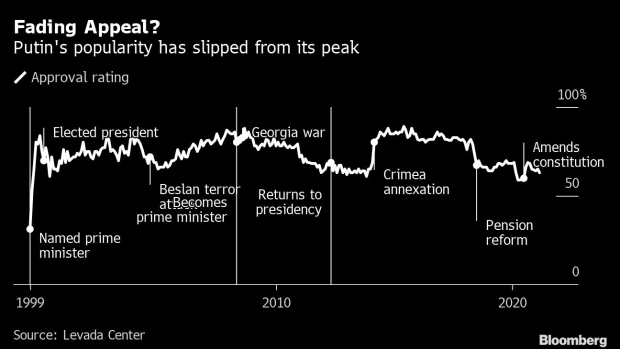Apr 21, 2021
Putin to Address Nation as Russia Braces for Navalny Protests
, Bloomberg News

(Bloomberg) -- President Vladimir Putin gives his annual state-of-the-nation speech Wednesday as Russia’s beleaguered opposition plans a countrywide show of force to demand the release of jailed Kremlin critic Alexey Navalny.
The authorities have threatened a crackdown on the unsanctioned protests, the first called by the opposition since Navalny was sentenced to 2 1/2 years in prison in February. Police rounded up key activists in several Russian cities, according to the OVD-Info monitoring group, ahead of the rallies that are due to begin in the Russian Far East as Putin starts his speech at noon in Moscow.
Putin remains broadly popular and Kremlin efforts to discredit and pressure the opposition have succeeded in blunting Navalny’s appeal, with polls showing nearly half of Russians say he was rightly imprisoned. The harsh tactics risk further alienating young Russians, the demographic most likely to support the anti-Putin movement, according to polls.
“The authorities, with the approval of the majority among older generations, prefer to act by means of threats and punishments,” Denis Volkov, an analyst at the independent Levada Center pollster, wrote this week. “This means, most likely, we may soon see new protests backed by young Russians.”
Navalny’s camp called the protest after warning that he was close to death in prison after three weeks on hunger strike that he began to demand access to outside doctors. On Monday, authorities announced they’d transfered him to a prison hospital.
More than 465,000 people have pledged anonymously to take part in demonstrations calling for his release, which are scheduled for 7 p.m. local time in all of Russia’s 11 time zones.
Military Buildup
The U.S. and the European Union have warned ahead of Putin’s speech that Russia will be held responsible if Navalny dies. The president has used the address in the past to boast of Russia’s military might and to paint a rosy picture of the country’s domestic achievements despite incomes that have stagnated for nearly a decade.
Last year, Putin announced plans to change the constitution, ultimately allowing him to remain president until 2036, in a move that led to new measures to boost state control over the population.
Lawmakers in Russia’s upper house of parliament will meet Friday to begin implementing measures announced in the president’s speech, which will have “special importance” this year, Speaker Valentina Matviyenko told the state-run Tass news service April 6.
The address comes amid the recent deterioration in relations with the West, which the Kremlin has said are at a historic low. The U.S. and the EU have expressed alarm over Russia’s unprecedented military buildup on its border with Ukraine, while Washington issued a new round of sanctions this month that target sovereign debt over hacking and election meddling allegations that the Kremlin denies.
Russia also expelled Czech and Bulgarian diplomats this week in tit-for-tat moves after spying scandals in the two countries with traditionally warm relations with Moscow.
Extremist Organizations
The protests will be a test of the opposition movement’s viability after many of its leaders were arrested or fled abroad when the authorities moved to crush rallies against Navalny’s detention and trial earlier this year.
Russian prosecutors this month asked a Moscow court to declare Navalny’s Anti-Corruption Foundation and his campaign offices to be extremist organizations, which could subject staff and volunteers to criminal prosecution and imprisonment.
A March Levada survey showed efforts to discredit Navalny have worked, with 48% of people saying his sentence was fair compared to 29% who believe it wasn’t.
Authorities have warned people to stay away from the gatherings and threatened to fine social media companies for carrying posts promoting the events. They have cast a broad net to stifle criticism, raiding an online student magazine earlier this month that portrayed the protests sympathetically.
“The opposition wasn’t prepared for the extent of the crackdown earlier this year, and they don’t have a strategy,” Konstantin Sonin, a Russian economist at the University of Chicago’s Harris School of Public Policy, said. “Ultimately they will have a choice: exile or arrest.”
©2021 Bloomberg L.P.






